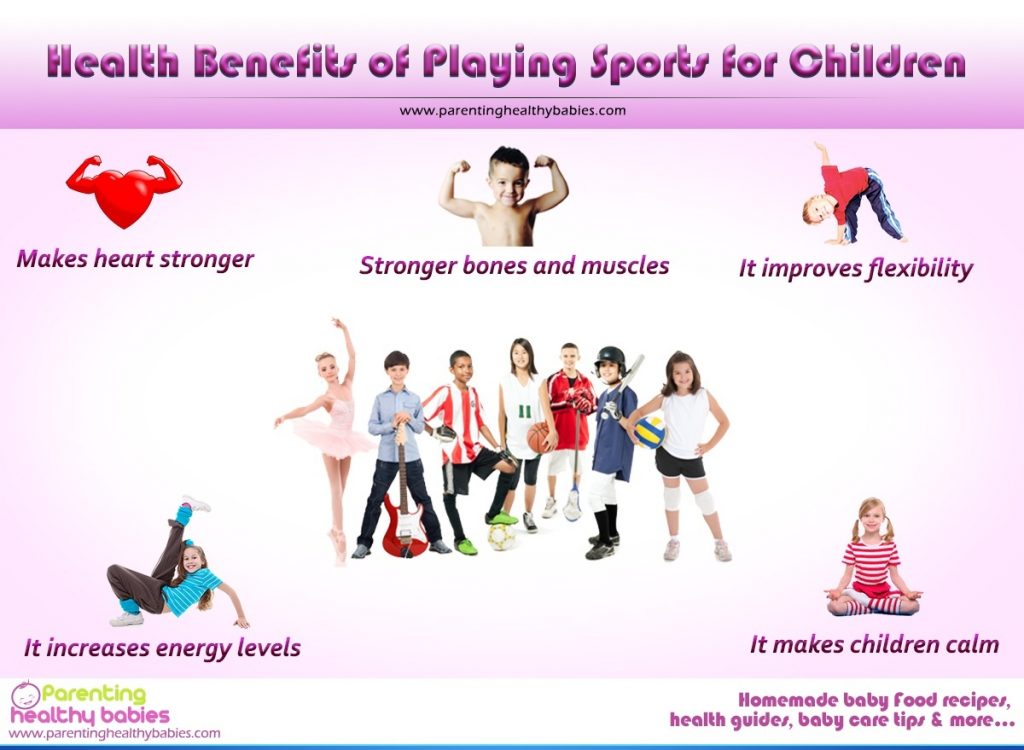It’s common for parents and teachers to talk about the importance of sports for children. With obesity in children rearing its head, it becomes all the more imperative to drive home the fact that for kids to play any sport of their liking is absolutely imperative. According to studies conducted, kids playing sports and being active have a direct and positive impact on a child’s health. Here are some of them :
Health Benefits of Playing Sports for Kids
Stronger bones and muscles
Children who play a sport regularly develop strong muscles and bones, thereby reducing their chances of suffering from injuries to their body and make them stronger for the future. Sport and exercise increase bone density, which prevents osteoporosis in later life when the bones become fragile, brittle and porous. By indulging in weight-bearing exercises, a child’s bone density, improve, particularly in girls. Teenage girls should play sports to prevent osteoporosis developing in later life.
Facilitates weight loss and weight control
Child obesity is one of the biggest challenges we are facing today. Considering the fact that one in every three kids are obese or overweight, it helps to get rid of excess weight at an early age. This problem results when kids don’t exercise and eat a lot of junk food, rather than nutritious, wholesome and home-cooked food. Overweight kids are likely to remain obese as adults, thereby putting them at risk for diabetes, heart problems, high blood pressure and cholesterol.
Read More: Childhood Obesity: Symptoms, Causes, Natural Treatment
When a child does not exercise, he leads a sedentary life, and tends to have an intake of more calories than his system requires. Unused, these calories get accumulated as fat and he turns overweight and later obese. However, on the other hand, a physically active child may have a shortfall of calories, which takes away the fat and reduces his weight. Reduced weight makes for an efficient and healthy heart and also helps those who suffer from diabetes.
A regimen of aerobic exercise can increase good cholesterol content and reduce high blood pressure that opens the gateway to stroke and kidney failure. Playing sports can help one lose weight that, in turn, helps reduce high blood pressure by burning calories. By controlling their weight through sports, kids can keep physically active and decreases their risk of obesity-related diseases, like diabetes and heart disease.
It makes the heart stronger
Since the heart is made up of muscle, it improves in performance when exercised, making it stronger and more efficient. By exercising, the heart can fight heart disease even among children.
It keeps the veins and arteries clear
With exercise and play, the amount of bad cholesterol and fats in a child’s blood is reduced. Physical activity also makes the walls of the blood vessels more flexible and reduces blood pressure, thus reducing a child’s chances of developing heart attack and stroke.
Physical activity enhances stamina and endurance
The more children go out to play, the more they experience enhanced heart stamina and muscular endurance, or their ability to work over a long period of time. The greater the endurance and stamina children have, the lesser the chances of them feeling tired doing other activities, or even playing or walking to and back from school or doing some chores at home. With this increased level of energy, a child can be mentally alert and enthusiastic for much longer than those who do not play and exercise.
It reduces chances of developing breast cancer
Girls who play sports and exercise regularly have decreased chances of developing osteoporosis, breast cancer and other forms of cancer such as colon, uterine and prostate.
Sports improves flexibility
Though children are flexible by nature, exercising and playing sports help them stretch their muscles in the course of play. If their coach brings in warm-ups at the start of play and static stretches at the end of the game, it will further enhance the children’s flexibility and agility.
Read More: 22 Best Summer Sports for Kids
It increases energy levels
Children can feel more energetic by becoming more physically active. This will keep them from feeling tired earlier in the day.
It makes the lungs stronger
Working out seriously increases lung capacity and its effectiveness in inhaling and exhaling air from the body. Consequently, more oxygen is taken into the body and an equal amount is exhaled, along with the expulsion of waste gases from the body.
It decreases blood sugar levels
By exercising regularly, sugar is prevented from accumulating in the blood by making the muscles pick up glucose from the bloodstream and use it as energy.This prevents children from developing diabetes.
It normalizes blood pressure
With exercise, stress levels that children face at school comes down significantly. Once this happens, a child’s risk for heart disease reduces.
It makes children calm
Children feel calm once they’ve exercised as during exercise, a natural substance in the body called beta-endorphin is released. Serotonin is also released due to exercise. It is associated with a feeling of well-being.
Apart from the above health benefits of physical activity and sports, children also benefit in other ways, such as having enhanced self-esteem, learns the importance of character-building skills like teamwork, responsibility and leadership, and teaches the importance of discipline.
How much activity do kids need?
- Kids need about an hour’s exercise every day. If they increase it, they stand to reap more health benefits.
- Kids should play at every available opportunity–after school, on weekends and on holidays.
- Exercise and sport needn’t be done all at once. It can be staggered in different forms through the day, for instance, cycling to and from school, being involved in games at school or organizing an event, playing in the evening at home or participating in an organized sport on weekends and after school.
What parents can do to help children be more physically active:
- Be a role model of physical activity to your children and let them see how much you enjoy what you do.
- Send them out to play in your backyard or in the park near your home, or swim, play cricket, soccer or basketball.
- Take out time to enjoy games as a family–nothing could be more fun.
With so many benefits of playing sports assured for children, why keep them cooped up in a flat and subject them to homework and dull activities around the house? Let them go out, play in the fresh air and build a healthy life.













